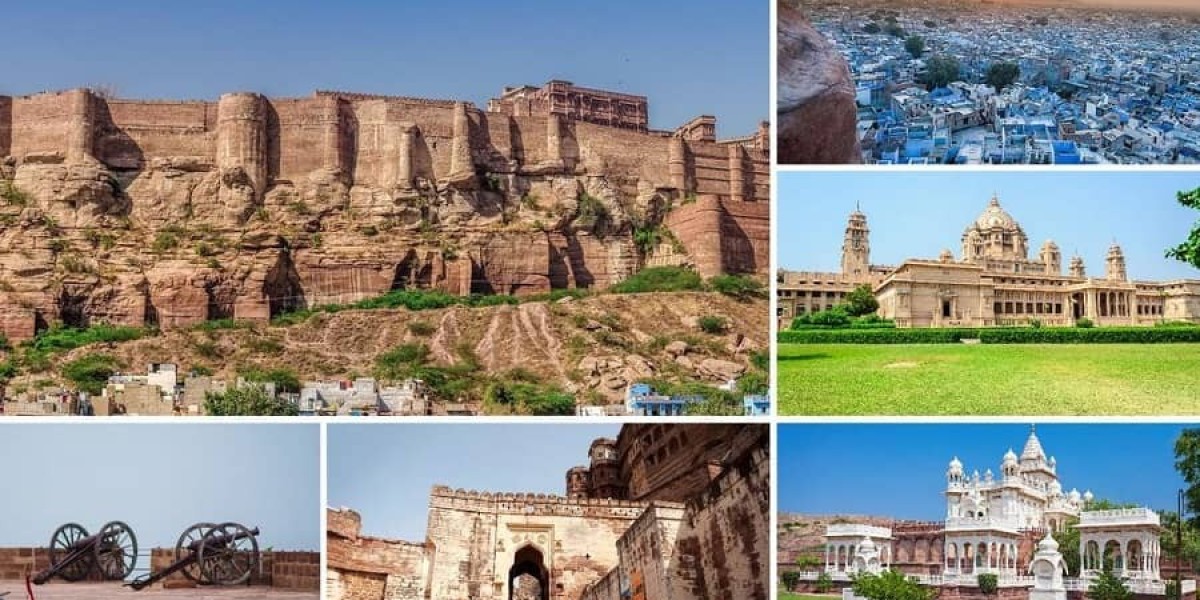Rajasthan is like a living museum of India’s royal history. The state holds grand forts, beautiful palaces, colorful markets, and old traditions that still breathe life into its streets. A Rajasthan Heritage Tour takes you back in time. You can walk through the same corridors where kings and queens once lived, see paintings that tell tales of battles and celebrations, and feel the charm of a glorious past.
When you explore Rajasthan, you step into a world where every stone has a story. From the golden sands of Jaisalmer to the pink streets of Jaipur, the journey shows how the royal families built cities, shaped culture, and left behind treasures that people admire even today.
This blog will take you through the essence of Rajasthan’s heritage, its must-visit cities, famous monuments, cultural beauty, royal festivals, heritage stays, and planning tips.
The Essence of Rajasthan’s Heritage
Rajasthan’s heritage is not only about old buildings. It is about the pride of its people, the courage of its warriors, and the creativity of its artists. For hundreds of years, this land saw battles, alliances, and celebrations. The rulers here built grand structures to show power and beauty. They supported art, music, and literature, which gave the state a rich culture.
You will notice three main elements in Rajasthan’s heritage:
Royal Architecture – Massive forts, carved palaces, stepwells, and temples.
Cultural Traditions – Folk music, dances, and colorful festivals.
Royal Lifestyle – Lavish hospitality, jewelry, clothes, and food.
The magic of Rajasthan lies in how these elements still exist today. People wear traditional clothes, cook age-old recipes, and celebrate festivals with the same joy as their ancestors.
Must-Visit Cities on a Rajasthan Heritage Tour
If you want to explore Rajasthan’s royal past, some cities must be on your list. Each has its own charm and story.
1. Jaipur – The Pink City
Jaipur is the capital of Rajasthan and a treasure of heritage. The city is famous for the Amber Fort, City Palace, and Hawa Mahal. Its markets sell colorful handicrafts, jewelry, and textiles. The streets have a pink hue, which gives Jaipur its name.
2. Jodhpur – The Blue City
Jodhpur is known for its blue-painted houses and the mighty Mehrangarh Fort. The fort offers a stunning view of the city. You can also visit Umaid Bhawan Palace and the busy markets around the clock tower.
3. Udaipur – The City of Lakes
Udaipur is a dream destination for heritage lovers. City Palace, Lake Pichola, and Jagdish Temple show the royal taste for beauty and art. The city also offers beautiful boat rides that give a peaceful view of palaces and hills.
4. Jaisalmer – The Golden City
Jaisalmer shines in the middle of the Thar Desert. Jaisalmer Fort, made of yellow sandstone, glows in the sunlight. The city also has havelis with intricate carvings and a desert safari experience that feels magical under the starry sky.
5. Bikaner – The Camel City
Bikaner is home to Junagarh Fort, beautiful temples, and a camel breeding farm. The city is also famous for its spicy snacks and sweets.
6. Pushkar – The Holy Town
Pushkar is known for its sacred lake and the only Brahma Temple in the country. The Pushkar Camel Fair is one of the most colorful events in Rajasthan.
Architectural Marvels That Tell Royal Stories
Rajasthan’s architecture reflects its royal history. The forts and palaces are more than just buildings; they are stories carved in stone.
Amber Fort, Jaipur
Amber Fort is a mix of Hindu and Mughal styles. The Sheesh Mahal (Mirror Palace) inside has thousands of tiny mirrors that sparkle when light falls on them.
Mehrangarh Fort, Jodhpur
Built on a hill, this fort tells the tale of bravery and power. Its museum displays weapons, royal costumes, and paintings.
City Palace, Udaipur
This palace complex stands by Lake Pichola. It has balconies, towers, and courtyards with stunning views.
Jaisalmer Fort
Unlike most forts, this one is still a living fort where people live and work. Its narrow lanes are full of shops selling handicrafts.
Junagarh Fort, Bikaner
This fort was never captured in battle. Its walls hide richly decorated halls and palaces.
Hawa Mahal, Jaipur
This five-story palace has hundreds of small windows. It was built so royal ladies could watch street events without being seen.
Cultural Heritage Beyond Monuments
Heritage is not just about what you see; it is also about what you hear, taste, and feel. Rajasthan’s cultural heritage is alive in its people’s daily life.
Folk Music and Dance
Kalbeliya dance, Ghoomar, and Bhavai are traditional dances that tell stories through movement. Rajasthani folk music uses instruments like the sarangi and dhol.
Handicrafts and Art
Rajasthan is famous for block printing, blue pottery, miniature paintings, and puppetry. Each craft reflects the region’s history and skill.
Cuisine
The food here is as royal as its history. Dal Baati Churma, Gatte ki Sabzi, Laal Maas, and Ghewar are some must-try dishes.
Rajasthan’s Festivals – Living the Royal Era
Festivals in Rajasthan are full of color and joy. They bring back the grandeur of the royal era.
Pushkar Camel Fair
This fair is a mix of cultural performances, camel races, and a huge cattle market.
Desert Festival, Jaisalmer
Held in February, it celebrates desert culture with folk dances, music, and camel shows.
Teej Festival, Jaipur
Women celebrate this festival with songs, dances, and processions.
Gangaur Festival
This festival honors Goddess Parvati and showcases traditional costumes and rituals.
Heritage Stays – Experiencing Royal Hospitality
One of the best ways to feel Rajasthan’s royal charm is by staying in heritage hotels. These are old forts and palaces turned into luxury stays.
Umaid Bhawan Palace, Jodhpur
Still home to the royal family, this palace offers luxury rooms and a royal dining experience.
Taj Lake Palace, Udaipur
Located in the middle of Lake Pichola, this white marble palace feels like it floats on water.
Samode Palace, Jaipur
This heritage hotel is known for its stunning interiors and warm hospitality.
By staying in these places, you not only get comfort but also live like royalty for a few days.
Tips for Planning a Rajasthan Heritage Tour
Best Time to Visit – October to March offers pleasant weather.
Plan Your Route – Cover cities that match your interests. Jaipur, Jodhpur, Udaipur, and Jaisalmer make a great circuit.
Book Early – Heritage hotels and guided tours fill up fast during peak season.
Hire Local Guides – They share interesting stories that make monuments more meaningful.
Pack Smart – Carry light cotton clothes for the day and a jacket for cool evenings in winter.
Respect Local Culture – Dress modestly when visiting temples or villages.
Try Local Food – Taste regional dishes to complete your cultural experience.
Conclusion
A Rajasthan Heritage Tour is not just a holiday. It is a time journey into India’s royal past. Every fort, palace, and street tells a story of courage, art, and tradition. From the pink charm of Jaipur to the golden magic of Jaisalmer, the experience makes you feel part of history.
The state keeps its heritage alive not only through monuments but also through its people, festivals, and hospitality. When you leave Rajasthan, you carry with you not just photos, but memories of royal tales, warm smiles, and timeless beauty.
If you wish to know India’s glorious history in the most vibrant way, Rajasthan is the place to start.








